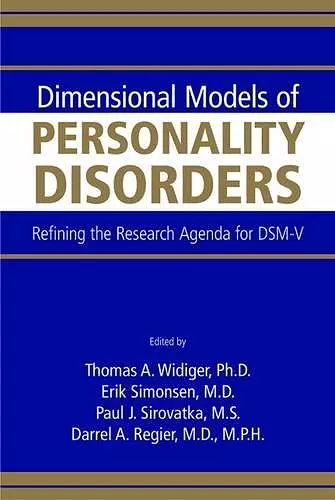Dimensional Models of Personality Disorders
Refining the Research Agenda for DSM-V
Paul J Sirovatka editor Darrel A Regier editor Thomas A Widiger editor Erik Simonsen editor
Format:Paperback
Publisher:American Psychiatric Association Publishing
Published:11th Dec '06
Currently unavailable, our supplier has not provided us a restock date

DSM-IV and ICD-10 both diagnose personality disorders categorically, yet studies indicate that many patients meet criteria for an excessive number of diagnoses, raising the question of whether personality disorders are discrete conditions or rather distinctions along dimensions of general personality functioning. This collection of papers renews long-standing proposals for a dimensional model of personality disorder, describing alternative models, addressing questions about their clinical application and utility, and suggesting that future research seek to integrate such models within a common hierarchical structure.
With contributions by preeminent researchers in the field, Dimensional Models of Personality Disorders is drawn from a conference series convened by APA, WHO, and NIH in order to plan for the fifth edition of the DSM. The Nomenclature Work Group concluded that consideration should be given to basing part or all of DSM-V on dimensions rather than categories, and recommended that a dimensional model for personality disorders should serve as a basis for exploring dimensional approaches in other areas. Accordingly, the volume opens with a presentation of 18 proposals for dimensional models and proceeds with provocative contributions on a number of related issues ranging from hard science to clinical practice. Among the topics addressed are
• Behavioral and molecular genetic research supporting an etiologically informed dimensional classification of personality disorders
• The as-yet tenuous associations between dimensional trait measures of personality as contained in the models of Cloninger, Depue, and Siever-Davis, and specific neurobiological measures, as examined in neurotransmitter research
• Potential links between childhood and adolescent temperament and personality dimensions and adult personality psychopathology
• Studies examining the covariation of personality dimensions across cultures
• The continuity of Axis I and Axis II disorders and a proposed hierarchical structure of mental disorders that integrates the psychopathology of Axis I disorders with specific personality traits
• The dual challenges of coverage and cutoffs that must be addressed if dimensional models are to be considered viable alternatives to the existing categorical diagnostic system
Although the editors acknowledge that concerns are certain to be raised regarding conversion to a dimensional classification—such as the disruption to clinical practice by a radical shift in diagnosing personality disorder—these papers make a strong case for opening the field to alternative ways of enhancing clinical utility and improving...
I enthusiastically recommend [Dimensional Models of Personality Disorders] to all people with an interest in the intersection of personality and disorder, be they clinicians, researchers, or students.
* PsycCRITIQUES *Clinicians with a serious interest in problems of psychiatric diagnosis in general, or in regard to personality disorders in particular, will find this volume illuminating.
* The Journal of Nervous and Mental Disease *This is a fascinating collection of presentations on personality disorders and alternative models for them. It does take a little time initially to understand the concept of a factor rating system and not a categorical model such as in DSM IV, and there are a lot of abbreviations for the myriad of personality tests and scoring systems. However, after getting my bearings, the discussions really expanded my understanding of the ongoing research on personality disorders both in terms of DSM V and the attempt to define them more clearly. I enjoyed the point-counterpoint method of the papers. Overall, an excellent choice for seeing where personality disorder work is and where it will be heading for the future.
-- Brett C. Plyler, M.D. * Doody ReviISBN: 9780890422960
Dimensions: 229mm x 152mm x 16mm
Weight: 408g
315 pages